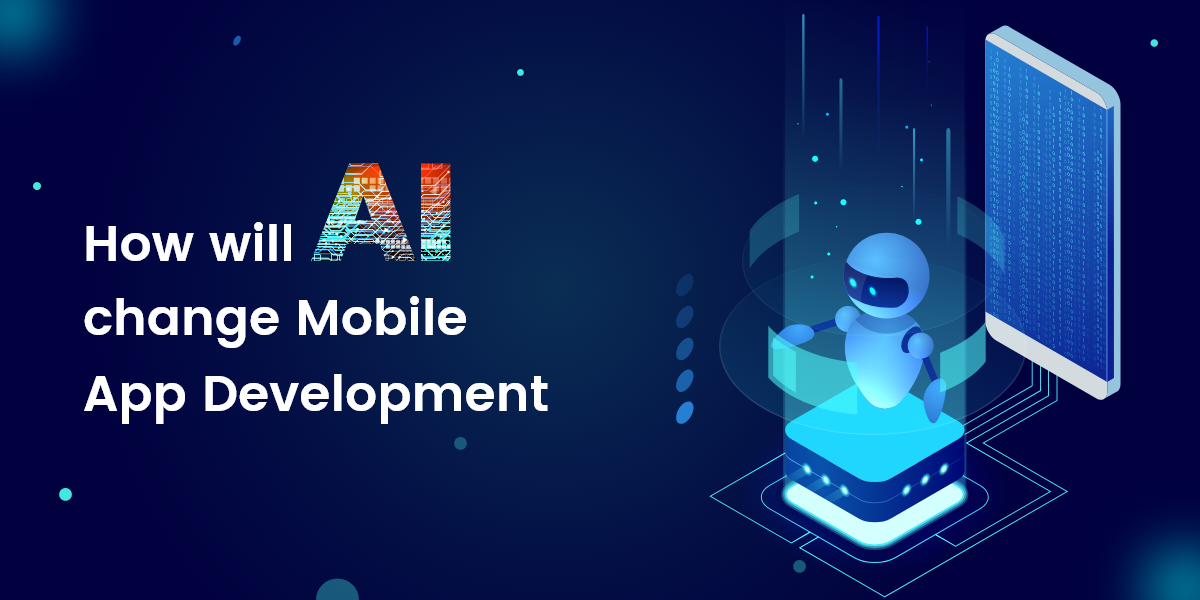How Will AI Change Mobile App Development?
- By Anuradha Badone
- 25-03-2022
- Mobile App Development

Many of our experiences these days on mobile apps revolve around Déjà vu. However, this is not a furious feeling. Unpeel the layers of AI in Mobile App Development, and you will come to know how that mobile app learned your choices and behavior and predicted your next action.
Artificial Intelligence is a power player in the mobile app development space. That said, companies should prepare for it now.
From enhancing user experience and solving real-life problems to optimizing operations and targeted marketing and pricing, AI underpins tremendous advancements to deliver value to a wide range of industries.
Its versatility has enhanced mobility and empowered businesses to solve complex problems by turning simple mobile apps into intelligent software products that sense users’ moods and respond accordingly.
Role of AI in Mobile App Development Optimization
Boosting User Experience Using AI & ML-based Analytics
Every UX designer looks to enrich the user experience to drive higher engagement. No matter how many features your app’s business case supports, it’s only the customer experience that drives business loyalty. That said, designers always vie to discover customer behavior.
Here is where AI comes into play. AI-powered by deep multi-task learning and ML-based analytics system helps UX architects gain deeper insights into user behavior and browsing patterns. Just by consuming this meaningful information, they can create hyper-personalized customer experiences for better user engagement.
Automating Tasks To Make Well-Informed Decisions
With a greater volume and variety of data processed by computational power, AI can analyze vast data sets speedily and accurately. Thus, helping businesses unlock value in just a matter of time. This quick acceleration leads-to-inspire well-informed business decisions and intelligent actions that are way beyond human capability.
For almost every industry, AI-based apps can be used as decision enhancement tools. For instance, healthcare providers can largely prevent medical data errors by benefitting from AI’s real-time clinical decision support. Likewise, e-commerce brands can learn the algorithms of their target market to predict the demands of specific goods encouraging them to share personalized recommendations. The use cases goes on for multiple other domains serving to automate day-to-day operations.
Delivering Personalized Experiences Guided By User Behavior
Nowadays, as brands are more easily able to reach a wider audience through digital marketing, they are more focused to take the right levels of personalization all the way to the individual. The AI-powered personalized experiences when integrated with mobile apps act as a marketing muscle across platforms. The hyper-personalized recommendations increase customer engagement, average order value, and drive higher conversions.
To make it work, AI-based platforms track users’ behavior, analyze their browsing patterns, preferences, interests, and mood to recommend a personalized workflow tailored to each user.
To get a better understanding, recall your interaction with Amazon.com. The e-commerce giant suggests to you the exact products you want to be inspired by your past browsing and purchase history. OTT platform Netflix is just another example. Netflix’s AI engine provides you most accurate series and movies recommendations based on your tracking data. Such personal level interactions reward brands with higher retention and user engagement along with long-term customer loyalty.
Enhanced Customer Interactions Using AI Chatbots
Chatbots powered by smart AI and ML-based algorithms are a complete solution package to improve customer interactions. They are no more limited to just conversational agents. These smart digital assistants when integrated with mobile apps get aligned with the CX customer experience and data technology stack.
These bots tracks and analyze huge customer behavioral data, intent, and sensitivities to address nearly all aspects of business like answering customer queries, making product and content searches easier, understanding user preferences, improving onboarding experience, etc. Such use cases help developers to save costs that could otherwise have gone to hiring a team of customer support executives.
Some of the major global brands where AI-chatbots are developed as business-driven interfaces are Bank of America, Stubhub, Whole Foods, and NBC among others. These chatbots have the capability to work as voice assistants, giving info about products, scheduling appointments, facilitating customer service at scale to name a few.
These small juggernauts ultimately help mobile apps increase conversion rates, boost customer loyalty, fuel the sales cycle, and generate enormous leads.
Enhanced Security With Voice & Facial Recognition
AI security features have become a mainstream component of mobile applications. These features especially when powered with facial recognition technology offer a plethora of benefits, from identifying the suspect and preventing crimes to reducing unwelcomed human interaction and maximizing safety and security.
Facial recognition makes the process automatic and seamless thus reducing the number of touchpoints such as fingerprinting. Whereas, voice recognition spells abilities like increase in productivity through text-to-speech in real-time and contributes to engaging with customers while eliminating the need for live representatives.
These all propositions help mobile app developers to offer a better customer experience and increased satisfaction with less operational costs.
Search Engine Optimization
The search engines function essentially knows what a user wants. When boosted by the power of AI, they become doubly intelligent. Through AI-based search engines, users get the exact search results they were looking for. These searches are influenced by users’ location, devices, behavior, and multiple other factors. Thus, helping app development companies to optimize searches.
Plus, apart from this it also helps users looking for products, without any prior knowledge of keywords, to leverage an AI-based visual search technique which when integrated into app development helps in optical recognition. Through this, they can simply tap on a product picture and search it via the AI function on the web. The search engine will automatically show up the related searches that resembles the picture.
The Bottom line
It’s important to highlight the practical applications of AI in mobile app development across industries and business functions are game-changing. Further, these AI techniques will continue to advance with the potential of introducing enhanced user experience, data security, privacy, customer service management, and delivering them hyper-personalized experiences. iOS and Android app development companies must adopt it to thrive and save costs and time at a greater scale


.jpg)
.jpg)
.jpg)
